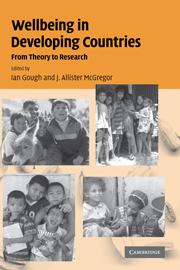Book contents
- Frontmatter
- Contents
- Figures
- Tables
- Notes on contributors
- Acronyms
- Preface
- Introduction
- 1 Theorising wellbeing in international development
- Part I Human needs and human wellbeing
- Part II Resources, agency and meaning
- Part III Quality of life and subjective wellbeing
- 10 Cross-cultural quality of life assessment approaches and experiences from the health care field
- 11 Researching quality of life in a developing country: lessons from the South African case
- 12 The complexity of wellbeing: a life-satisfaction conception and a domains-of-life approach
- Conclusion: researching wellbeing
- References
- Index
11 - Researching quality of life in a developing country: lessons from the South African case
Published online by Cambridge University Press: 22 September 2009
- Frontmatter
- Contents
- Figures
- Tables
- Notes on contributors
- Acronyms
- Preface
- Introduction
- 1 Theorising wellbeing in international development
- Part I Human needs and human wellbeing
- Part II Resources, agency and meaning
- Part III Quality of life and subjective wellbeing
- 10 Cross-cultural quality of life assessment approaches and experiences from the health care field
- 11 Researching quality of life in a developing country: lessons from the South African case
- 12 The complexity of wellbeing: a life-satisfaction conception and a domains-of-life approach
- Conclusion: researching wellbeing
- References
- Index
Summary
Introduction
Situated on the tip of the world's poorest continent, South Africa serves as a social laboratory for studying quality of life in developing countries. Classified as a middle-income country, it straddles the Developed and Developing World divide. It is a nation characterised by vast income inequalities, many levels of development and cultural diversity in terms of language, religion, ethnicity and settlement patterns. It is this rich mix of material and cultural differences that lends itself to experimenting with concepts and measurement instruments that capture the essence of quality of life.
This chapter reports the South African Quality of Life Trends Project, which commenced in the late 1970s and spans twenty-five years. Currently managed by Rhodes University's Institute of Social and Economic Research in Grahamstown, the project has tracked the satisfaction and happiness of South Africans against the backdrop of changes occurring in society before and after the coming of democracy (Møller 1988b, 1989, 1992a, 1994b, 1995a, 1998, 1999a; Møller and Dickow 2002; Møller and Schlemmer 1983, 1989). The South African initiative was a child of its time and, to a certain degree, reflects the developments and the sophistications that have occurred in quality of life studies and the social indicators movement during its forty-year history. There may be lessons to be learnt from its successes and shortcomings which have become evident with the wisdom of hindsight. The story of the project is divided into three parts: the experimental, consolidation and innovation phases of the project.
- Type
- Chapter
- Information
- Wellbeing in Developing CountriesFrom Theory to Research, pp. 242 - 258Publisher: Cambridge University PressPrint publication year: 2007
- 15
- Cited by



